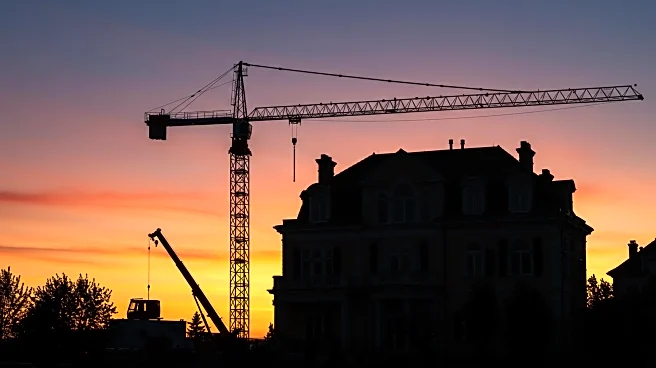What's Happening?
Kanye West's former Malibu mansion, originally purchased for $57.25 million in 2021, is back on the market for $34.9 million. The property, designed by renowned architect Tadao Ando, was gutted by West in an attempt to transform it into a personal 'bomb shelter' and 'bat cave.' However, the project was abandoned, leaving the mansion as a concrete shell exposed to the elements. The property was later acquired by Belwood Investments for $21 million, significantly less than West's purchase price. Belwood began restoration efforts, but the process has been fraught with delays. The mansion was listed earlier this year for $39 million and entered into contract with Andrew Mazzella Ventures LLC. However, negotiations have stalled, and the property is now relisted for $34.9 million.
Why It's Important?
The relisting of Kanye West's former mansion highlights the challenges and financial implications of high-profile real estate investments. The property's fluctuating value underscores the risks associated with ambitious renovation projects, especially when they involve unique architectural designs. The stalled negotiations and ongoing restoration efforts reflect broader issues in the luxury real estate market, where complex projects can lead to prolonged uncertainty and financial losses. Investors and developers involved in such ventures face potential setbacks, impacting their financial strategies and market positions.
What's Next?
The future of the Malibu mansion remains uncertain as negotiations between Belwood Investments and Andrew Mazzella Ventures LLC continue. If the deal falls through, Belwood may seek other buyers or investment opportunities to recoup its costs. The property's unique design and location may attract interest from other luxury developers or investors willing to complete the restoration. The outcome of these negotiations could influence future real estate transactions involving high-profile properties and complex renovation projects.
Beyond the Headlines
The situation with Kanye West's former mansion raises questions about the ethical and cultural implications of altering iconic architectural works. The decision to gut a renowned architect's design for personal use reflects broader trends in celebrity real estate, where personal preferences can clash with architectural integrity. This case may prompt discussions about preserving architectural heritage and the responsibilities of high-profile property owners in maintaining the cultural value of their investments.









